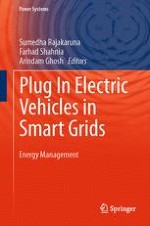2015 | OriginalPaper | Chapter
2. Smart Coordination Approach for Power Management and Loss Minimization in Distribution Networks with PEV Penetration Based on Real Time Pricing
Authors : Bhuvana Ramachandran, Ashley Geng
Published in: Plug In Electric Vehicles in Smart Grids
Publisher: Springer Singapore
Activate our intelligent search to find suitable subject content or patents.
Select sections of text to find matching patents with Artificial Intelligence. powered by
Select sections of text to find additional relevant content using AI-assisted search. powered by
